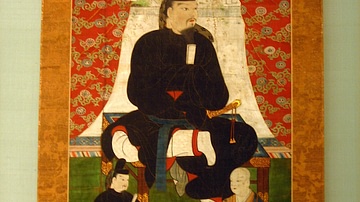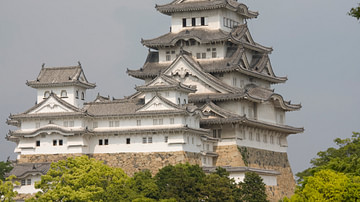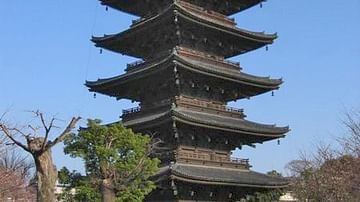Search
Search Results

Definition
Oda Nobunaga
Oda Nobunaga was the foremost military leader of Japan from 1568 to 1582. Nobunaga, along with his two immediate successors, Toyotomi Hideyoshi (1537-1598) and Tokugawa Ieyasu (1543-1616), is credited with unifying medieval Japan in the second...

Definition
Fujiwara Clan
The Fujiwara clan (Fujiwara-shi) was a powerful extended family group which dominated all areas of Japanese government during the Heian Period (794-1185). Founded by Fujiwara no Kamatari in 645 CE, male members held on to key official positions...

Definition
Himeji Castle
Himeji Castle, located in the town of Himeji in the Hyogo Prefecture of Japan, was built on a natural hilltop between 1581 and 1609 CE. The complex is composed of a maze-like arrangement of fortified buildings, walls, and gates, with a six-storey...

Definition
Minamoto Clan
The Minamoto clan was an extended family group which dominated Japanese government and the imperial court in the 12th and 13th centuries CE. The clan famously defeated their arch rivals the Taira in the Genpei War of 1180-1185 CE and included...

Definition
Toyotomi Hideyoshi - Unifier of Japan
Toyotomi Hideyoshi (1537-1598) was a Japanese military leader who, along with his predecessor Oda Nobunaga (1534-1582) and his successor Tokugawa Ieyasu (1543-1616), is credited with unifying Japan in the 16th century. Hideyoshi rose from...

Definition
Heiankyo
Heiankyo (Kyoto), located in the centre of Honshu island, was the capital of Japan for over a thousand years and gave its name to one of the golden ages of Japanese history, the Heian Period (794-1185 CE). Built according to Chinese design...

Definition
Edo Castle
Edo Castle was a large castle built by the Tokugawa family in 17th-century Japan. It served as their seat of government for more than 260 years. After the Meiji Restoration of 1868, Edo became the capital of Japan and was renamed Tokyo. Edo...

Definition
Chushingura
Kanadehon Chushingura (A Treasury of Loyalty of Loyal Retainers or The Story of the Forty-Seven Samurai) is the most popular play in the history of Japanese theatre, first performed in 1748. It is a work of fiction, but the details of the...

Image
Ashikaga Takauji
A painted silk portrait thought to represent Ashikaga Takauji (r. 1338-1358), first shogun of Japan's Ashikaga shogunate (aka Muromachi shogunate) which would rule Japan until 1573. (The Shogun is show in a traidtional seated posture and...

Article
Japanese Castles
Fortifications of one kind or another had been used in Japan since ancient times, but in the period from 1576 until 1639, a new and distinctive style of castle was constructed. Rather than being used for fighting, these were impressive structures...